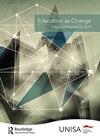How Female Students Are “Educated” to Retreat from Leadership: An Example from the Chinese Schooling Context
IF 1
4区 教育学
Q3 EDUCATION & EDUCATIONAL RESEARCH
引用次数: 1
Abstract
Women’s continued under-representation in leadership positions is well documented. This article asserts that part of the reason for this can be found within educational settings. Chinese educational environments are examined using secondary data analysis, and it is argued that a) the protective approach that teachers adopt towards female students, b) the reserved and unworldly female images exhibited by textbooks, and c) the improper view of leadership that girls tend to develop through classroom-based leadership experiences combine to damage girls’ leadership potential. These mechanisms are usually unintentional and hard to detect, which means that part of the solution lies in promoting the awareness of teachers and educational leaders. Meanwhile, it is important to note that this issue is not merely about equal treatment for both genders; rather, it is broadly linked to our construction of leadership as a concept. Ultimately, the educational setting is expected not only to produce an equal number of “great women” and “great men”, but also—partly through its explorations of how to cultivate the female version of a “great man”—to contribute to updating and advancing the “leadership” concept and practice as a whole.女学生如何被“教育”退出领导:一个来自中国学校背景的例子
妇女担任领导职务的人数仍然不足,这是有据可查的。这篇文章断言,这种情况的部分原因可以在教育环境中找到。本文利用二手数据分析对中国的教育环境进行了考察,认为a)教师对女学生采取的保护方式,b)教科书中展示的矜持和不世故的女性形象,以及c)女孩在课堂领导经历中倾向于形成的不正确的领导观,这些因素共同损害了女孩的领导潜力。这些机制通常是无意的,很难发现,这意味着解决方案的一部分在于提高教师和教育领导者的意识。同时,重要的是要注意到,这个问题不仅仅是关于男女平等待遇的问题;相反,它与我们将领导力作为一个概念的构建有着广泛的联系。最终,教育环境不仅被期望产生同等数量的“伟大的女人”和“伟大的男人”,而且——部分通过探索如何培养女性版的“伟大的男人”——有助于更新和推进“领导”的概念和实践。
本文章由计算机程序翻译,如有差异,请以英文原文为准。
求助全文
约1分钟内获得全文
求助全文
来源期刊

Education As Change
EDUCATION & EDUCATIONAL RESEARCH-
CiteScore
1.40
自引率
0.00%
发文量
29
审稿时长
24 weeks
期刊介绍:
Education as Change is an accredited, peer reviewed scholarly online journal that publishes original articles reflecting critically on issues of equality in education and on the ways in which educational practices contribute to transformation in non-formal, formal and informal contexts. Critique, mainly understood in the tradition of critical pedagogies, is a constructive process which contributes towards a better world. Contributions from and about marginalised communities and from different knowledge traditions are encouraged. The articles could draw on any rigorous research methodology, as well as transdisciplinary approaches. Research of a very specialised or technical nature should be framed within relevant discourses. While specialised kinds of research are encouraged, authors are expected to write for a broader audience of educational researchers and practitioners without losing conceptual and theoretical depth and rigour. All sectors of education are covered in the journal. These include primary, secondary and tertiary education, adult education, worker education, educational policy and teacher education.
 求助内容:
求助内容: 应助结果提醒方式:
应助结果提醒方式:


